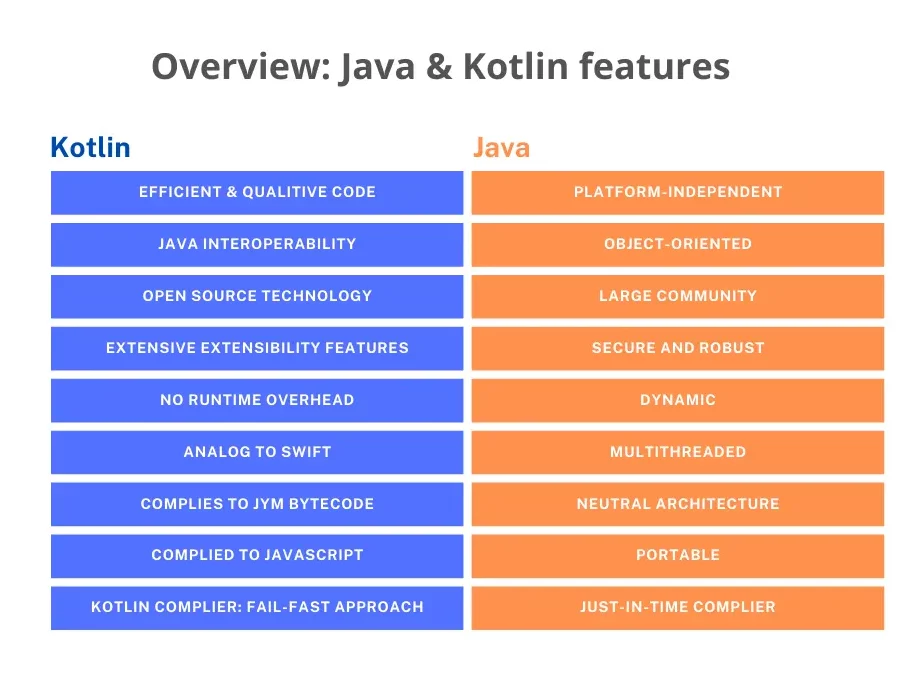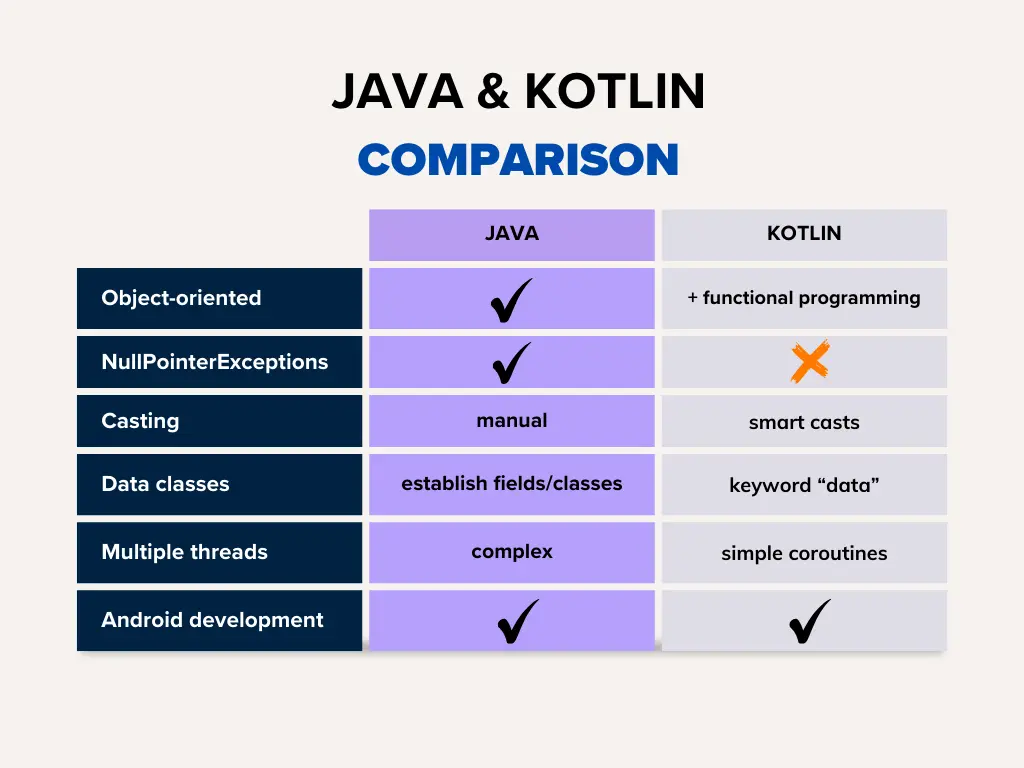Key Advantages of Kotlin Over Java for Backend Development


If you plan to work on an Android-based project, you may wonder which programming language to select – Kotlin or Java. Java can boast a vast ecosystem, whereas Kotlin is known for decreased boilerplate, clear and concise syntax. Is Kotlin better than Java? The answer depends on the needs of your project. Generally, Java is applied to robust platforms (e.g. legacy systems), and Kotlin is implemented to provide more innovative solutions based on Android. However, it is worthwhile to consider all the pros and cons of each option to make up your mind. This post touches upon the primary benefits of Kotlin and gives a short overview of the specifics of Kotlin and Java. Without further ado, let us proceed to the topic.
Java is an open-sourced, object-oriented and general-purpose programming language launched in 1995. It functions on a wide range of devices, servers and operating systems. Additionally, it can work on JVM – Java Virtual Machine. Java performs type-checking during compile time (it is a statically typed language).
Kotlin, likewise, is an open-source language that runs on JVM and was introduced back in 2016. Kotlin’s advantages over Java include faster compilation, simpler and cleaner code. This programming language is grounded in a combination of functional and object-oriented programming. Google selected Kotlin as the second official programming language for Android applications in 2017. Shortly after that, in 2019, this programming language was introduced as the most favoured one for Android development.

| 1. Simplicity and Conciseness. As mentioned before, Kotllin possesses a more concise and expressive syntax than Java. It results in a reduced amount of code that needs to be written to perform the operation. The conciseness of Kotlin is obtained due to boilerplate code elimination and the use of constructs that are closer to natural language. Another difference between Kotlin and Java relates to supporting type inference by the former language. Hence, developers do not need to specify data types of particular variables explicitly. |
| 2. Advantages of functional programming. As Kotlin was conceived as a partially functional programming language, it supports a variety of essential functions, such as extension, lambda expressions and higher-order functions. These features are critical for enhancing the quality of code. Due to its object-oriented origin, Java has more limitations in this regard. |
| 3. Enhanced Null Safety and Type Inference. When working with Java, developers can assign null values to any variable. As a result, you may get null pointer exceptions in a runtime. Kotlin requires software engineers to explicitly state if certain variables can be null or not. Developers cannot do so by default: attributing null values to all objects or variables is not possible. Consequently, it helps prevent null pointer exceptions during your runtime, which can serve as another argument for Kotlin in the Kotlin vs Java discussion. In addition, Kotlin’s type inference enables the data types of expressions and variables to be deducted automatically, which reduces the need for you to declare data types explicitly. The feature is helpful for maintaining type safety and obtaining readable and concise code units. |
| 4. Interoperability with Java. As mentioned previously, you can utilise either Java or Kotlin code units within one project. In addition, software engineers can call a Java method from the Kotlin code if needed. |
All these advantages of Kotlin over Java contribute to Kotlin’s overall performance and efficiency benefits, such as reducing the number of boilerplates, leveraging the performance optimisations of the JVM, supporting cross-platform development, and more.

Due to the rapid growth of Kotlin, we conclude that this programming language is a promising option for Android development. In PNN Soft, we take advantage of Kotlin to develop cross-platform solutions for various industries, from the retail and entertainment sector to fintech, banking and insurance business sphere. Yet, we also turn to Java as a reliable general-purpose programming language. Will Kotlin replace Java? It is currently difficult to answer this question. Undoubtedly, Kotlin has undergone a quantum leap in recent years. However, Java possesses a trustworthy and robust toolkit, and hence, it will probably not be replaced by Kotlin that quickly.
Consequently, the choice of the programming language largely depends on the specifics of your project. Another factor is how confident and fluent software engineers are in these programming languages. The PNN Soft team will gladly help you turn your ideas into efficient and future-proof solutions. If you want to apply Java or Kotlin for Android projects, fill out the form below.